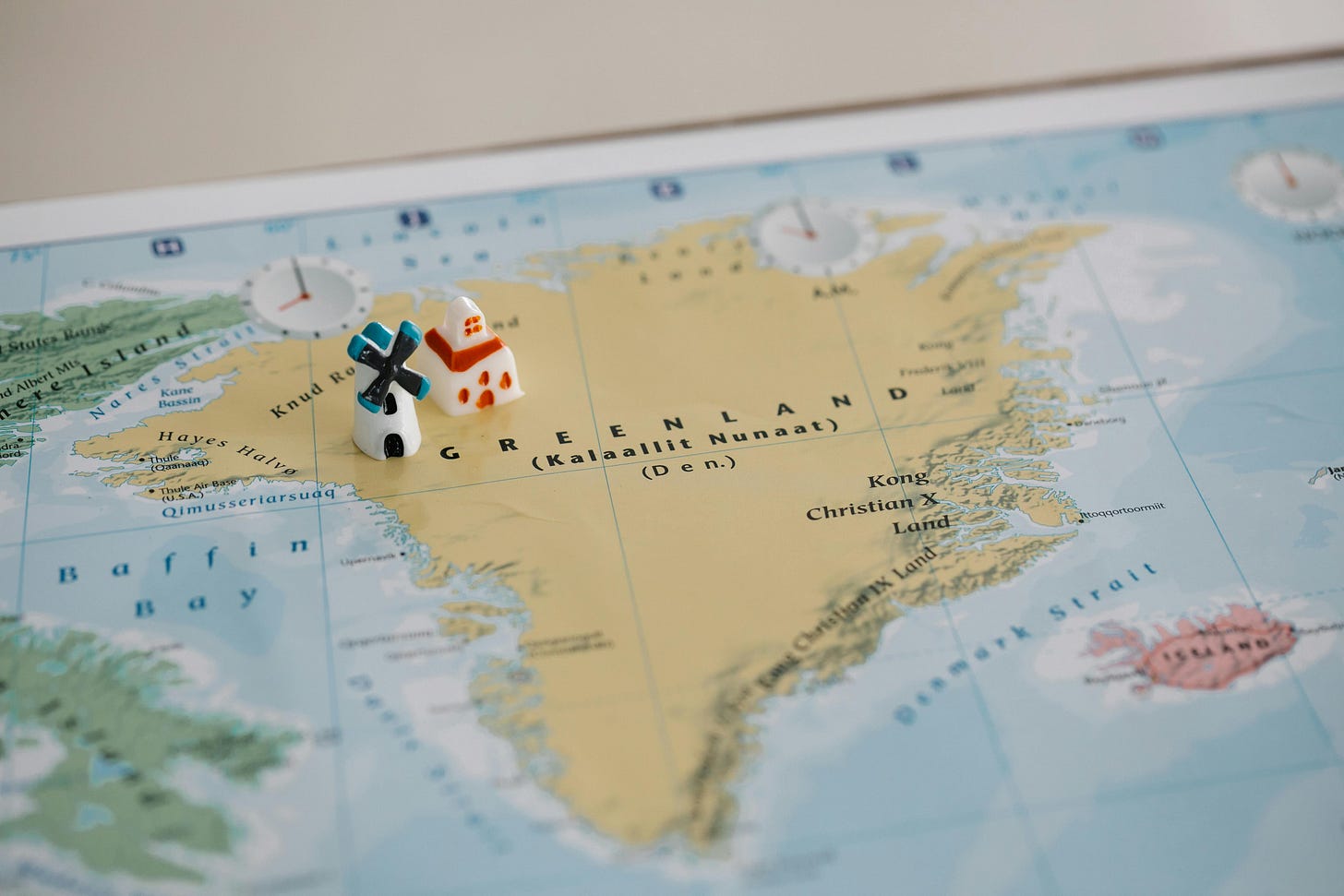I don’t believe it is likely Donald Trump will order the seizure of Greenland by military force, but I can no longer assert that I find it unthinkable.
“Unthinkable” is a special word for scholars of international relations. For something to be unthinkable means that, even if it is a physically possible strategy, it is so far beyond the bounds of probity that one could not imagine an actor seriously entertaining the thought.
In intro lectures, “unthinkable” is the sort of word we use to illustrate how relations in Europe have changed over the past century. In 1914, the standard line goes, everyone knew that relations between France and Germany made war not only thinkable but the central question of each other’s foreign policy. By contrast, now in 2025, everyone knows that war between France and Germany is not only out of the question—it is unthinkable.
To be unthinkable is to be socially impossible. It is to be taboo—sometimes, as with the hypothesis of the “nuclear taboo”, the parallel is explicitly made: it is said to be unthinkable that anyone would ever seriously consider using nuclear weapons against a non-nuclear state.
(As with much of this newsletter that isn’t engaged with a close reading of a particular text or a fine analysis of a particular phenomenon, non-expert readers should know that—quelle surprise—the full story is much longer and more nuanced than this 800-word newsletter can convey. Expert readers who object to some of these simplifications should similarly know that I am aware that there is more nuance but also that the sorts of takeaways that leak from our labs are not necessarily more nuanced, and they are invited to reflect on the art of homiletics. In either case, the presentation I give here is pretty accurate at the level of overview that’s appropriate to the tempestuous age, so I am not misleading anyone.)
By now, you should be thinking: hey, didn’t the United States just inaugurate a president who
appointed as secretary of defense someone who is manifestly short of the traditional standards for the job?
nominated as director of national intelligence someone who, well, ditto?
announced in his inaugural address that “We gave [the Panama Canal] to Panama, and we’re taking it back”?
is trying to put the ultimate anti-vaxxer in charge of the largest Cabinet office?
attempted a light coup?
has seen his net worth increase by literally tens of billions of (“on paper”) dollars because of a meme coin?
has withdrawn security protection from his political rivals while they are under credible threats of violence?
It’s a little too depressing to go on. You get the idea.
Unthinkable doesn’t mean much when you’re dealing with a president that is not socialized into the “right” way to think—who, in fact, delights in a performative transgressivity that involves shredding your notions of what is unthinkable?
Hmm, yes. Now that you mention it, maybe this guy is not someone to whom the usual strictures of “unthinkability” matters. Here’s a slide that I put in my intro lectures as part of a discussion of social media and foreign policy during the first term:
In this case, though, I think that there is more at play with regard to Greenland. Trump has a definite pattern when it comes to leaders who engage in territorial aggrandizement: he respects it. His objection to Putin’s invasion of Ukraine (2022 ed.) is not, at root, that he views international aggression as unthinkable—for him, wars of conquest were not outlawed by the 1928 Kellogg-Briand Pact or the lessons of the subsequent reconstruction following the Second World War.
Many people, myself included, have casually described Trump as having a nineteenth-century view of international relations. I think we should take this literally and seriously. I think that we should view Trump as being essentially an offensive realist who does not believe that institutions have any force and that norms are what the strong make of them. I do not believe anymore that he will be restrained by anything more than might, or by his calculation of what is in his interest.
Realists and idealists alike get a lot of mileage out of discussing the Melian Dialogues, a snipped of The Peloponnesian War by the Greek historian Thucydides that has just a bunch of banger lines, like when the Athenian delegate, sent from the superpower, to the island of Melos flicks a finger at the representatives of the tiny, weak island:
For ourselves, we shall not trouble you with specious pretences—either of how we have a right to our empire because we overthrew the Mede, or are now attacking you because of wrong that you have done us—and make a long speech which would not be believed; and in return we hope that you, instead of thinking to influence us by saying that you did not join the Lacedaemonians, although their colonists, or that you have done us no wrong, will aim at what is feasible, holding in view the real sentiments of us both; since you know as well as we do that right, as the world goes, is only in question between equals in power, while the strong do what they can and the weak suffer what they must.
In the era of Trump, you can read this with an outer-boroughs accent:
I know about power. Nobody, probably, knows more about power than me, probably in the history of the whole world. Power has its own logic, harsh logic, beautiful logic. Did we build this beautiful empire? Yes. Did we kick out the Medes? Maybe. I don’t know. Who are the Medes? I never heard of them. But that's not why we're here. When you're strong like us—and we're very, very strong, probably the strongest ever - you do what you want.
So let’s seriously think about what’s going on.
Trump believes Greenland is important to U.S. national security.
He’s pursued this policy for years.
Republicans are not pushing back on this.
Greenland is mostly empty and held by a country that Trump appears not to respect. At all. (Media reports of his call with Denmark’s PM read a lot like the Trumpian Dialogue above.)
Unlike Ukraine (or Taiwan!), Greenland is sparsely populated and could probably be seized, like, really fast.
Can you really, really say that you’re not a little bit worried that we’re not in a sort of Green Dawn scenario? Do you think that, like, Pete Hegseth will say no if the White House gives the orders?
I don’t want to push this thought too far. Maybe I’m crazy. To be clear, I would not lay odds that this will happen. “Merely” slapping enormous tariffs on Denmark is more likely. Denmark is a major supplier of pharma and vaccines—including Olempic!—to the United States, with nearly 1.8 percent of its GDP coming from exports to the USA in the general pharma sector. That’s a pretty good target for 25 percent tariffs.
(The consequences of Trump using “only” tariffs against Denmark as part of this land grab would be catastrophic and far-reaching. It would be one thing for the USA to, say, reduce its commitment to European security after Russia had launched a war of conquest in the Euros’ backyard. It would be another thing for the USA to do that and also launch a trade war of conquest. I struggle to think of a parallel. To predict the consequences of an invasion and seizure of Greenland is unthinkable because it’s like asking “what would happen if gravity smelled like Roquefort?” And yet!)
I do think, however, that we run the risk of having our expectations anchored by too conservative a baseline, and I now think the first Trump term is too conservative a baseline. We now have a president who is seriously musing aloud about using U.S. forces in Mexico, pledging to “take back” the Panama Canal, and will not stop talking about Greenland. Congress seems much less likely to do anything meaningful to put up resistance even with the thinnest House majority. This is day six. What will happen by day sixty?
Is it crazy to think the unthinkable? Or is it delusional to not contemplate it?






Whatever the odds of Trump trying something unthinkable are, the odds that someone in his administration would try to stop him are worse. ("It's just Greenland. We need to save our powder in case we have to talk him out of nuking France.")